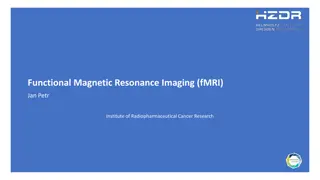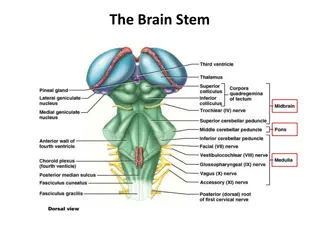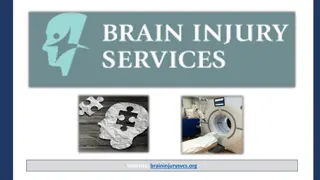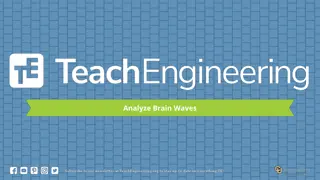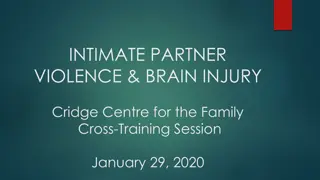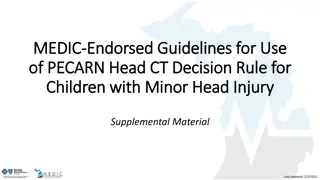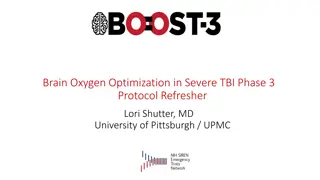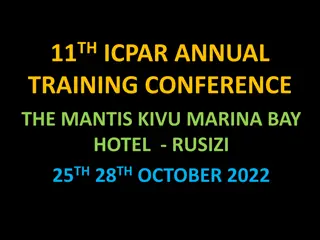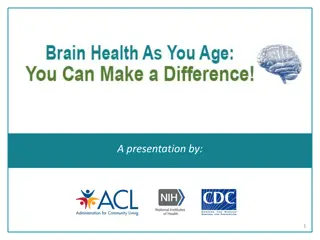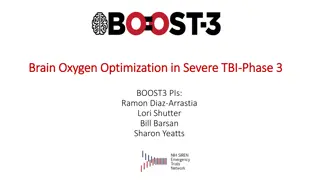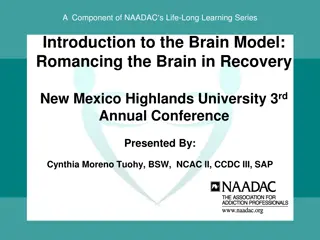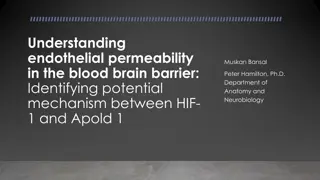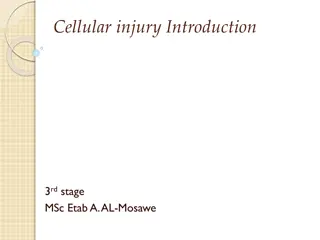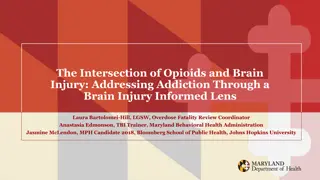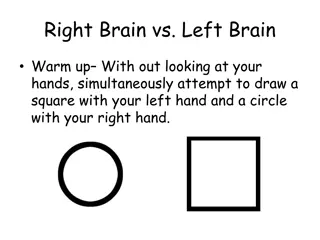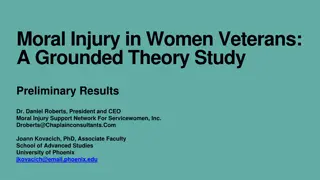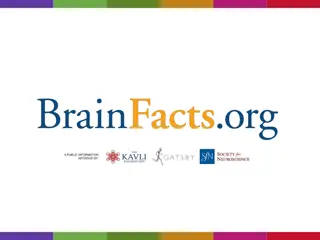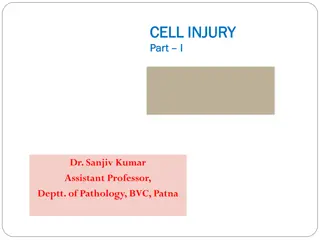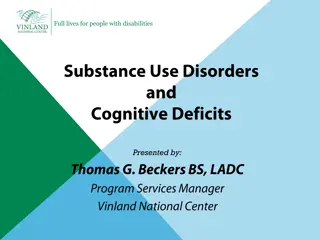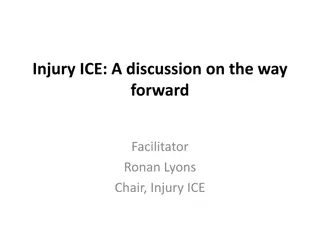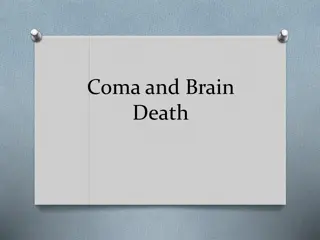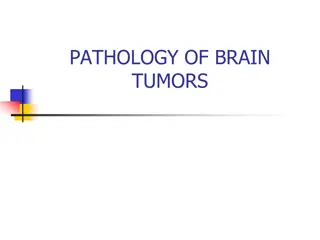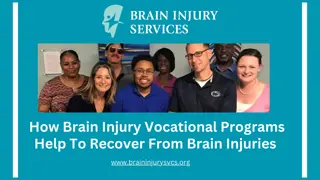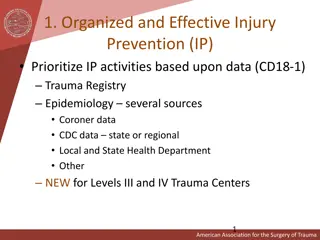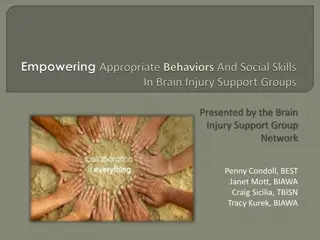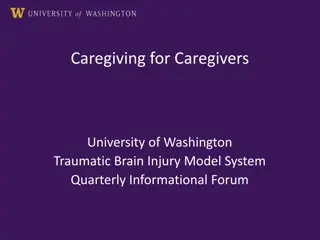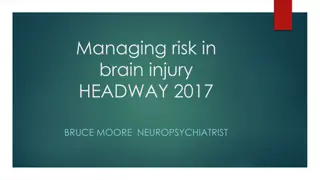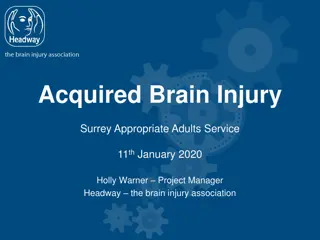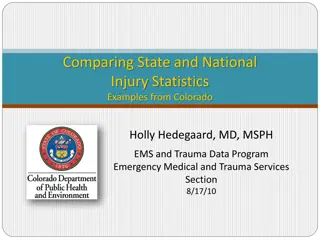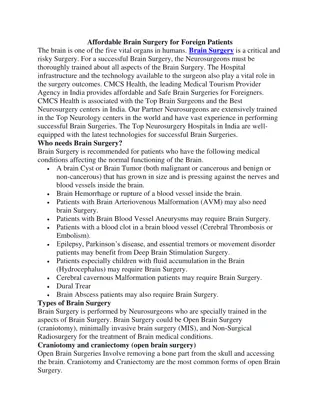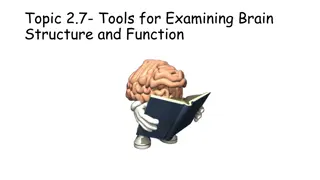Comprehensive Overview of Brain Imaging Techniques and Anatomy
Explore the world of brain imaging with functional MRI, MRI techniques, brain anatomy, neuronal activation, and brain vasculature explained in detail, shedding light on brain regions and their functions.
10 views • 53 slides
Understanding the Brain Stem and its Functions
Explore the intricate structures of the brain stem, including the midbrain, pons, and medulla oblongata. Learn about the functions of the cerebellum, its role in controlling postural reflexes and producing skilled movements. Discover the thick tracts connecting the cerebellum to the brain stem and t
8 views • 20 slides
Understanding the Brain: Stem, Midbrain, Pons, Medulla, and Cerebellum Functions
Explore the complex structures and functions of the brain, including the brain stem, midbrain, pons, medulla, and cerebellum. Discover how these regions play crucial roles in controlling reflexes, movements, and vital functions like respiration and posture. Learn about the thick tracts connecting th
7 views • 21 slides
Injury Surveillance in Scotland: Importance and Implementation Overview
Scotland's Public Health body, Public Health Scotland, leads efforts in injury surveillance to prolong healthy life, prevent disease, and promote health. Long-term investment in prevention involves various sectors. Injury surveillance is crucial as it helps manage and prevent injuries, with coded da
4 views • 24 slides
The Truth Revealed Does Cannabis Harm Brain Cells.docx
The Truth Revealed: Does Cannabis Harm Brain Cells?\nIn recent years, the debate surrounding the effects of cannabis on brain health has intensified. With the growing popularity of cannabis and the increasing accessibility of products from online weed dispensaries and marijuana dispensaries, it\u201
9 views • 3 slides
Brain Injury Services: Empowering Recovery and Support
At Brain Injury Services, we are committed to making a positive difference in the lives of individuals affected by brain injury. Through our comprehensive support services, compassionate care, and commitment to empowerment, we empower survivors to overcome obstacles, reclaim their independence, and
6 views • 7 slides
Exploring Brain Waves Through EEG Analysis
Delve into the world of brain waves with EEG, EKG, and EMG measurements. Learn how to analyze brain wave data using mathematical processes like Fast Fourier Transform (FFT) and Power Spectral Density (PSD). Discover the significance of different frequencies in brain wave signals and how they reflect
1 views • 13 slides
Understanding Intimate Partner Violence and Brain Injury Connections
The link between intimate partner violence (IPV) and brain injury is significant, with studies showing a high prevalence of brain injuries among IPV survivors, particularly women. Common types of IPV causing brain injury include hits to the head, strangulation, and banging the head against objects.
1 views • 23 slides
Guidelines for PECARN Head CT Decision Rule in Children with Minor Head Injury
Michigan Emergency Department Improvement Collaborative (MEDIC) endorses the PECARN Head CT Decision Rule for children with minor head injury to standardize and reduce overuse of CT scans. This rule, developed and vetted by experts, aims to improve clinical decision-making, reduce costs, radiation e
4 views • 11 slides
Brain Oxygen Optimization in Severe TBI - Protocol Summary
In the severe traumatic brain injury (TBI) protocol, intracranial monitors measuring ICP and PbtO2 are placed within 12 hours of injury. Procedures include FiO2 challenges to check PbtO2 reliability and assess cerebral physiology. Challenges involving FiO2, MAP, and CO2 help guide ventilator setting
2 views • 27 slides
Unlocking the Power of the Human Brain: Insights from 11th ICPAR Annual Training Conference
Delve into the intricacies of the human brain at the upcoming 11th ICPAR Annual Training Conference themed around "Brain Power to Embrace Change and Emotional Stability." Explore the control center of our minds, the cerebral cortex, the limbic system, and the role of neurons in conscious mental reac
0 views • 57 slides
Maintaining Brain Health and Cognitive Function: Key Factors and Risks
Aging well and maintaining brain health require a combination of genetic, environmental, and lifestyle factors. While age-related changes in memory and learning may occur, adopting a healthy lifestyle, avoiding risks like smoking and excessive alcohol use, and being aware of how medicines can impact
0 views • 23 slides
Brain Oxygen Optimization in Severe Traumatic Brain Injury (BOOST3) Trials Overview
Overview of the BOOST3 trials focusing on brain oxygen optimization in severe traumatic brain injury patients. The trials involve multiple PIs, training sessions, and hands-on ancillary studies. Various design principles and organizational values are emphasized, with grant awards distributed to diff
0 views • 13 slides
Personal Injury and Compensation Claims Overview
Stewarts law firm focuses on serious injury claims, emphasizing a client-centered approach to personal injury litigation. This presentation aims to provide a basic understanding of compensation claims for serious injuries, the difference between clinical negligence and personal injury cases, and the
0 views • 20 slides
Exploring the Brain and Conflict Resolution in Recovery
Delve into the complexities of the brain with a focus on the limbic system and cortex. Learn how the brain reacts in conflict situations and discover strategies for conflict resolution in recovery. Gain insights into the functions of the limbic system, located at the center of the brain, and the cor
0 views • 25 slides
Investigating HIF-1 and Apold-1 in Endothelial Permeability at the Blood-Brain Barrier
Understanding endothelial permeability at the blood-brain barrier is crucial for drug delivery to the brain. This research aims to identify a potential mechanism between HIF-1 and Apold-1 specific to cerebral epithelial cells that may impact the integrity of the blood-brain barrier. The study involv
0 views • 14 slides
Understanding Cellular Injury and Its Manifestations
Cellular injury can occur due to various factors like physical trauma, chemicals, radiation, and biologic agents. This process can lead to reversible or irreversible damage in cells, affecting their normal functions and possibly leading to cell death. Manifestations of cellular injury include cellul
0 views • 9 slides
The Intersection of Opioids and Brain Injury: Addressing Addiction Through a Brain Injury Informed Lens
Exploring the correlation between traumatic brain injury (TBI) and the opioid crisis, this content delves into the alarming statistics of opioid overdoses and their impact on individuals with brain injuries. Highlighting the overlap and consequences of these two major health issues, it sheds light o
0 views • 45 slides
Understanding the Right Brain vs. Left Brain Theory
Explore the intriguing concept of right-brain vs. left-brain dominance theory, where each side of the brain is associated with different thinking styles. Delve into the history, key characteristics, and tasks attributed to the right and left hemispheres, and learn more about the work of Roger Sperry
0 views • 8 slides
Insights on Moral Injury Among Women Veterans: Preliminary Study Findings
Preliminary results from a grounded theory study on moral injury in U.S. women veterans reveal themes such as sexual assault, hostile work environments, and more. Participants shared their experiences, highlighting the nature of moral injury they faced, distinguishing between various forms of discri
0 views • 21 slides
The Intriguing Connection Between Emotions and the Brain
Exploring the complex relationship between emotions and the brain reveals that while our heart often takes the spotlight for feelings, it is actually the brain that plays a crucial role in regulating emotions. The limbic system, composed of various brain structures, controls emotional responses, suc
0 views • 10 slides
Understanding Cell Injury and its Causes in Pathology
Rudolph Virchow's concept of disease starting at the cellular level is explored in this content, focusing on the impact of the external environment on cell equilibrium. The role of the plasma membrane as a barrier and the definitions of normal cell function, adaptation, reversible injury, irreversib
0 views • 16 slides
Safety Performance in Western Australia's Mineral Industry 2010-11
This presentation provides insights into safety performance in the Western Australian mineral industry for the year 2010-11. It includes definitions of key terms such as Lost Time Injury (LTI), Serious Injury, Minor Injury, Disabling Injury (DI), and various rates used to measure safety performance.
0 views • 21 slides
Full Lives for People with Disabilities - Addressing Traumatic Brain Injury
Traumatic Brain Injury (TBI) presents a significant public health concern in the United States, often termed as the silent epidemic due to its hidden nature. This condition affects thinking and memory, impacting individuals' lives profoundly. Resources such as "The Essential Brain Injury Guide" shed
0 views • 23 slides
International Collaborative Effort on Injury Statistics and Methods (Injury.ICE)
Injury.ICE is a global collaboration dedicated to standardizing methods for comparing injury statistics worldwide to inform policy responses. The organization welcomes participation from academia, government statistical agencies, and NGOs. The structure includes a Steering Committee and open members
0 views • 8 slides
Understanding Coma, Brain Death, and the Examination Process
Exploring the definitions of coma and altered consciousness, understanding brain death examinations, criteria for determining brain death, who can perform the exam, Texas law on the definition of death, and components of a brain death exam. Learn about different states of altered consciousness, the
0 views • 14 slides
Epidemiology and Pathology of Brain Tumors - Overview and Incidence Statistics
This information provides an in-depth overview of the epidemiology, classification, and pathology of brain tumors. It covers the relative incidence of various brain tumors, including astrocytoma, glioblastoma, meningioma, and others. The data also includes statistics on the occurrence of brain tumor
0 views • 98 slides
How Brain Injury Vocational Programs Help To Recover From Brain Injuries
Brain Injury Services provide essential support for individuals recovering from brain injuries. By offering personalized counseling, rehabilitation programs, and vocational training, they empower clients to regain independence and enhance their quali
4 views • 7 slides
Cognitive and Behavioral Management Strategies for Traumatic Brain Injury Patients
This presentation focuses on addressing challenging cognitive, behavioral, and personality issues associated with traumatic brain injury (TBI). It outlines cognitive issues such as attention, speed of processing, learning, memory, and executive functioning. Cognitive management strategies include te
0 views • 18 slides
Activate Your Brain with Rhythm and Movement for Enhanced Learning
Engage both sides of the brain by incorporating rhythm and movement into education with STEAM activities. Enhance memory retention, reading readiness, and critical thinking skills through various exercises like brain dance, rhythm activators, and tiptoe feet. Discover the benefits of maintaining a s
0 views • 17 slides
Effective Strategies for Injury Prevention in Trauma Centers
Organized and data-driven injury prevention activities are crucial in trauma centers. Community partnerships, evidence-based reviews, designated injury prevention coordinators, and involvement of trauma personnel are key elements for successful injury prevention. Targeting contributing factors like
0 views • 20 slides
Effective Strategies for Managing Brain Injury Support Group Meetings
Strategies for managing brain injury support group meetings include setting group agreements, creating safety plans, practicing appropriate communication skills, and understanding emergency response roles. It is essential to address conflicts, prepare meeting environments, and involve members in est
0 views • 24 slides
Understanding Caregiving for Traumatic Brain Injury Survivors
Caregiving for individuals with Traumatic Brain Injury (TBI) is a crucial yet challenging role undertaken by family members or friends. The responsibilities can be overwhelming, impacting both the survivor and the caregiver's well-being. This presentation highlights the needs of caregivers, survivor
0 views • 22 slides
Managing Risk in Brain Injury: Strategies and Considerations
This informative content covers essential aspects of risk management in brain injury, including balancing client needs, promoting independence, and positive risk taking. It delves into the different parts of the brain, their functions, and the potential effects of brain injury on intellectual, behav
0 views • 14 slides
Understanding Acquired Brain Injury: Facts, Challenges, and Stories
Acquired Brain Injury (ABI) is a complex condition that encompasses various causes such as traumatic brain injury, stroke, brain aneurysm, and more. This type of injury can lead to cognitive, physical, and communication difficulties, impacting individuals in profound ways. Survivors of ABI may face
2 views • 24 slides
The Relationship Between Cognitive Flexibility and Psychological Flexibility After Acquired Brain Injury
This study explores how cognitive flexibility and psychological flexibility interact after an acquired brain injury. It examines whether individuals who exhibit cognitive inflexibility can achieve psychological flexibility, considering the impact of cognitive impairments post-injury. Cognitive flexi
0 views • 21 slides
Exploring Computational Theories of Brain Function
In this series of images and text snippets, the discussion revolves around the emerging field of computational theories of brain function. Various aspects such as symbolic memories, the relationship between the brain and computation, the emergence of the mind from the brain, and computational thinki
0 views • 53 slides
Comparative Analysis of Injury Statistics Between Colorado and National Data
This study compares injury statistics between Colorado and national data, focusing on injury deaths, hospitalizations, and diagnosis codes. The purpose is to analyze NHDS and HCUPNet data for national estimates, highlighting differences in hospital discharges for various injury categories. The analy
0 views • 13 slides
Affordable Brain Surgery for Foreign Patients
The brain is one of the five vital organs in humans. Brain Surgery is a critical and risky Surgery. For a successful Brain Surgery, the Neurosurgeons must be thoroughly trained about all aspects of the Brain Surgery. The Hospital infrastructure and t
0 views • 2 slides
Exploring Brain Structure and Function: Tools and Insights
Discover how scientists study the brain through accidents like Phineas Gage's, lesions, and advanced techniques like EEG, CAT, MRI, PET, and fMRI. Learn about the divided brain, split-brain patients, and the role of the corpus callosum in communication between brain hemispheres.
0 views • 8 slides
